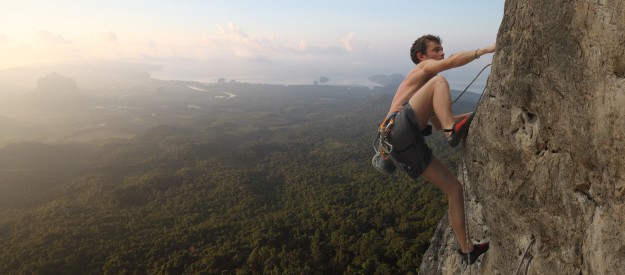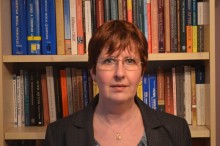"We are losing our attitude of wonder, of contemplation, of listening to creation and thus we no longer manage to interpret within it what Benedict XVI calls 'the rhythm of the love-story between God and man.'"
+ Pope Francis
George, Grisez, and gravity beyond the cliff

‘The expectation of a new earth ought not to dampen but rather to enkindle our concern for cultivating this earth, where the body of the new human family grows….’ Gaudium et spes. #39[1]
The only thing more difficult than persuading environmentalists to take natural law seriously it seems is persuading natural lawyers to debate environmental issues. So I was excited when Robert George entered the lists with an article over at First Things commenting on Pope Francis’s forthcoming encyclical on climate change.
Sadly, George did not tell us what his own views are on climate change or how this relates to his natural law moral framework. Instead he simply clarified the scope of Papal teaching authority.
George’s “ibuprofen analogy” was slightly baffling. If the Pope taught that this medicine is dangerous to unborn children, George explained, such teaching would not be binding since he has no special scientific knowledge and no authority to pronounce on such matters. Yet it seems far-fetched to imagine an encyclical asserting a scientific opinion for which there is no evidence. Under what conceivable circumstances would Pope Francis—a chemistry graduate—suppose ibuprofen to be an abortifacient? Otherwise the article seemed fairly uncontroversial, or so I thought.
Then Michael Sean Winters charged into the fray.
Winters argued that the Pope does have special knowledge concerning the empirical reality of climate change through his uniquely extensive network of connections reaching out to those suffering its impacts. There is some truth in this. Visiting Zimbabwe last year, where refugees from the Tokwe Mukosi flooding are still desperately vulnerable, I listened to elderly people talk of the changes in rainfall patterns they have observed over their lifetime. As Bill Patenaude points out in a recent post, Pope Francis listens to bishops, who listen to priests, who listen to stories like these. He is also influenced by economic and scientific experts. He has his own organic internet. This is an empirical evidence-base you cannot currently tap with a search engine or with access to peer-reviewed studies in the University library.
I am not saying this invalidates George’s point on the scope of papal teaching authority, but it would seem prudent to weight the pope’s opinions on such matters accordingly. The process of writing an encyclical and the rigorous review procedure to which it is subjected is not likely to leave much room for scientific nonsense regarding the effects of headache medicine. Or climate change.
Winters complains that Robert George gives equivalent weight to the authority of climate ‘believers’ and ‘skeptics.’ Perhaps he does. In his riposte, George recommends Freeman Dyson, Richard Lindzen, William Happer, and Ivar Giaever as credible academic authorities.
Winters attacks the credentials of three of them, leaving Richard Lindzen as the last man standing for the contrarian cause. Lindzen’s theory—known as ‘the iris effect’—proposes that reduced cirrus cloud formation as the climate warms will counteract the greenhouse effect. Unfortunately he has not been able to demonstrate this. He does however accept the basic physics of greenhouse warming, calling people who dispute the fact that carbon dioxide is a greenhouse gas ‘nutty’. He agrees that human activities are responsible for rising stocks of atmospheric pollutants which would be expected to cause warming. Thus far Robert George has not told us where he himself stands on the skeptical spectrum, but a recent poll showed that most Americans including nearly half of Republicans now think the US government should take action on climate change.
If Winters were to nominate four expert witnesses to give evidence, I wonder whom he might call?
Off the top of my head, my suggestions would be Oxford Professor Myles Allen, co-author of an important paper on the carbon budget approach, David McKay, Professor of Engineering at Cambridge, David Hone, author of Putting the Genie Back and Climate Change Advisor for Shell, and Sir David King, co-author of The Hot Topic. There is of course a very large deck of eminent scientists from which to deal a panel of experts who take climate change seriously, of whom these are just my top four cards.
Let us suppose that between them these experts were able to persuade Robert George the problem exists. How might he apply natural law moral truths to the climate challenge?
He would surely endorse Grisez’s two norms for human use of nature: (a) in enjoying and using nature one should revere the creator and (b) natural entities should be used reasonably and with restraint in the pursuit of intelligible human goods.[See here, 4a & b] The duty to protect and the dignity of the human person would be key concepts, from which he might derive principles of climate justice based on universal rights and the imperative to preserve God’s gift of nature for the benefit and enjoyment of future generations.
George might also critique exploitative models of development—as Germain Grisez does—and note that greenhouse gas pollution distorts the market, causing injustice, resource depletion and disincentives for clean energy development. On this basis he might conclude that true freedom and authentic development requires the market correction of carbon pricing. It will be interesting to see how these issues are addressed in the new encyclical, which may be published as early as June this year.
Germain Grisez is an influential figure in Catholic moral theology, yet his contribution to environmental ethics is not widely recognised. Few scholars appreciate that Grisez advocates eating less meat, both for health reasons and because this would enable more people to enjoy basic food security.
Such issues are all the more pressing in an age of climate instability: crop production is threatened by increased severe weather events and changing rainfall patterns. Biofuels for aviation and heavy goods vehicles—for which we have no other renewable solutions—will increasingly compete for land in a carbon-constrained market. At the same time demand for pasture is escalating as global meat consumption continues to rise. The practice of fasting for climate justice has a practical dimension as well as creating an opportunity for reflection on these complex ethical issues. A call for ecological recovery of this tradition seems appropriate in response to climate change as a “sign of the times.”
Grisez argues we have a duty to care for and protect domestic and wild species. Although he does not propose that animals should have ‘rights’ he does see them as bearers of inherent value, as God’s good creatures. How might he respond to the prospect of human-caused mass extinction of coral reef ecosystems and endangered wildlife?
Unfortunately these are not the catastrophic predictions of a few climate alarmists based on worst-case scenarios: they are sober expectations based on the internationally agreed two degree guardrail that we are currently on course to transgress. Even in Looney Tunes land, Professor George, there is only so far out over that cliff edge you can run before gravity catches up with you.
John Paul II and Benedict XVI link natural and human ecology in their teachings; it will be interesting to see how Pope Francis continues to develop this motif.
The metaphor of the environment as a womb in which the body of the new human family grows seems to be of particular significance for Grisez. He prefaces two of the three volumes of his magnum opus “The Way of the Lord Jesus” with a quotation from Gaudium et spes, to which this image is central.
Discussing Christian mission—which he portrays as a complex unity between evangelism and social action—Grisez again invokes the womb metaphor to include environmental concerns in Catholic action to promote social justice, peace and the advancement of science and culture.
Although some environmentalists have dismissed the new natural law as anthropocentric, as I read him Grisez’s ethics is actually inherently green. If his influence is discernible in Pope Francis’s thinking on ecology we might expect to see a renewed emphasis on natural law and the virtues of the Beatitudes as the source of norms for environmental stewardship.
Such a move might come as a surprise to those who see the debate in polarised "Road-runner v. Wile E. Coyote" terms, but it would be in keeping with Catholic doctrinal development on ecology.
So I very much hope that Robert George and other defenders of Grisez’s theological ethics will continue to be part of the conversation both before and after publication of the new encyclical on climate change. There are difficult ethical issues that need to be addressed if we are to build a sustainable economy and secure a safe, prosperous future. Solutions will need to be interdisciplinary; cultural as well as technical changes will be necessary if we are to find a way to meet the challenge.
Perhaps the revival of natural law will provide a key to unlocking an authentic Catholic response.
 Jacaranda Turvey Tait is a doctoral candidate in the Department of Theology and Religious Studies at the University of Chester. She is a graduate in chemistry and law, and her research interests are in the application of Catholic natural law theory to environmental ethics and public policy. Photograph by Ben Tait
Jacaranda Turvey Tait is a doctoral candidate in the Department of Theology and Religious Studies at the University of Chester. She is a graduate in chemistry and law, and her research interests are in the application of Catholic natural law theory to environmental ethics and public policy. Photograph by Ben Tait


















